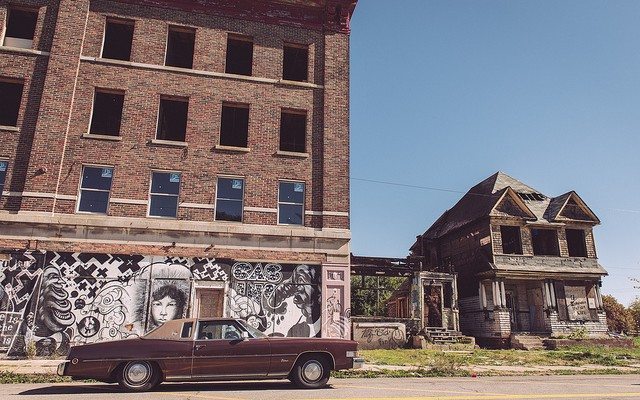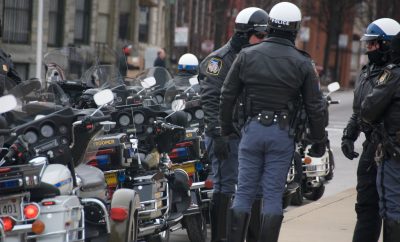
Crime
Crime in America: Top 10 Most Dangerous Cities Over 200,000
In the United States, there is a disproportionately high level of violent crime in densely populated areas; however, crime levels in similar-size cities vary to a wide degree. This calls us to investigate what factors make certain cities safer or more dangerous than others.
To properly compare and analyze these cities, we group them into large and small categories. A large city is considered to be one that has a population greater than 200,000 people. We hen further adjust for population by ranking each city by its violent crime rate, which is the measure of how many violent crimes occurred per 100,000 people in 2012.
Violent crime is defined by the total number of murders, aggravated assaults, robberies, and forcible rapes during the year. Although murder is included in the aggregate violent crime rate, we also report the murder rate separately for each city. For additional information on Law Street’s crime-ranking methodology, click here.
Here are the 10 Most Dangerous Large Cities in the United States based on the FBI’s most recent Uniform Crime Report statistics, released September 16, 2013:
1. Detroit, Mich.
Detroit holds its place atop our list of the Most Dangerous Large Cities, and is second only to Flint, Mich. in the overall rankings, as it continues to suffer from a long term decline in population and employment. Detroit’s $18 billion bankruptcy filing in July was the largest municipal bankruptcy in U.S. history. Although the city’s unemployment rate has dropped from its peak of 18.2 percent in July 2009, it remains well above the national level. In the 1950s, Detroit was the fifth-largest city in the United States with nearly 2 million residents, but now fewer than half as many people call it home. The city has an estimated 78,000 abandoned homes spread across 140 square miles — a vast expanse that contributes to Detroit’s infamous 58-minute police response time. The city ended the year with a total of 386 murders and 15,009 violent crimes in 2012.
Violent Crime Rate: 2122.91 per 100,000 people
Population: 707,096
Murder Rate: 54.59 per 100,000 people
Officer to Population Ratio: 1:275
Median Household Income: $27,862
Unemployment Rate: 10.5 percent
Dangerous City Over 200,000 Rank in 2011: #1
2. Oakland, Calif.
Historically, crime has been a problem for Oakland, but in 2012 the number of reported violent crimes reached a decade high point. Despite its high crime rate, the city’s officer-population-ratio reveals that Oakland has relatively fewer sworn officers than many of the major cities on this list. Recently, the city re-implemented a gang violence reduction plan that had been effective in the past for Oakland, as well as for other California cities. The plan known as Operation Ceasefire emphasizes a problem-oriented policing approach to crime hot spots. The focus is on gun trafficking and gang violence. Operation Ceasefire marks a big change for the Oakland police department, which hopes that prioritizing the most urgent emergency calls will significantly reduce local crime.
Violent Crime Rate: 1993.31 per 100,000 people
Population: 399,487
Murder Rate: 31.79 per 100,000 people
Officer to Population Ratio: 1:638
Median Household Income: $51,144
Unemployment Rate: 8.1 percent
Dangerous City Over 200,000 Rank in 2011: #3
3. St. Louis, Mo.
Although St. Louis moved down in the rankings from its number two spot last year, it has consistently been ranked as one of the most dangerous cities over the past seven years. St. Louis recently encountered significant budgeting pressures due to its expanding public pension costs. As a result, the city’s police department was forced to cut back on the number of its patrolling officers. St. Louis is also set to lose a federal grant at the end of this year that covered the cost of 20 officers, causing Police Chief Sam Dotson to fight hard for budget increases. Dotson also emphasizes “hot-spot” policing, which involves increasing patrols in dangerous areas during times when crimes are most likely to occur. Criminologist Richard Rosenfeld argues that the reason St. Louis is ranked so high is, in part, a matter of geography. If suburban crime statistics were included, the crime rate would be diluted.
Violent Crime Rate: 1,776.46 per 100,000 people
Population: 318,667
Murder Rate: 35.46 per 100,000 people
Officer to Population Ratio: 1:241
Median Household Income: $34,402
Unemployment Rate: 7.6 percent
Dangerous City Over 200,000 Rank in 2011: #2
4. Memphis, Tenn.
For the second year in a row, Memphis holds its position as the fourth most dangerous large city in America, and was ranked sixth overall in 2012. In addition to Memphis’ rank, Tennessee claimed the number one spot in the ranking of the most dangerous states in terms of violent crime per 100,000 people.
According to a Gallup poll last year, only 55 percent of the Memphis population responded that they feel safe in the city, the lowest percentage among the 50 largest metropolitan statistical areas. With an unemployment rate of 11.1 percent and a major proportion of the city living under the poverty line, Memphis is ranked number one as the nation’s poorest city by its collected census data. The city ran a $26.5 million budget deficit, and projections indicate that this figure could rise to as high as $36.5 million if the current tax rate remains the same. With all the economic disadvantages Memphis is facing it is no surprise that it remains high in the rankings of most dangerous large cities.
Violent Crime Rate: 1,750. 28 per 100,000 people
Population: 657,436
Murder Rate: 20.23 per 100,000 people
Officer to Population Ratio: 1:272
Median Household Income: $37,072
Unemployment Rate: 9.0 Percent
Dangerous City Over 200,000 Rank in 2011: #4
5. Stockton, Calif.
Stockton, like Detroit, is another city that recently filed for bankruptcy after running up a debt of $900 million to the California Retirement System Fund. Because the city’s main focus has been on getting its debt paid off, Stockton has been unable to devote more resources to curtailing its high level of violent crime. Pension promises are on the verge of collapse, leading to dramatic budget cuts that have gutted essential public services such as the fire and police departments. Although Stockton’s unemployment rate has decreased slightly over the past two years, it remains very high at 15.2 percent. With 71 murders in 2012 and a median household income of $45,606, the city ranks number five on this list.
Violent Crime Rate: 1547.95 per 100,000 people
Population: 299,195
Murder Rate: 23.74 per 100,000 people
Officer to Population Ratio: 1:904
Median Household Income: $47,365
Unemployment Rate: 15.2 Percent
Dangerous City Over 200,000 Rank in 2011: #8
6. Birmingham, Ala.
Birmingham moved down one spot in 2012 to sixth place on our list of most dangerous large cities. Although Birmingham has a relatively low unemployment rate, the median household income is under $32,000, well below the national average of $52,762. Nearly 25 percent of Birmingham’s residents live below the poverty line, almost 10 percentage points below the national average of 14.3. Although Birmingham moved down in the rankings, its violent crime rate per 100,000 residents experienced a slight increase, from 1483 in 2011 to 1,517 in 2012. The city also experienced a notable increase in murders, going from 54 in 2011 to 67 in 2012. The high murder rate in Birmingham has prompted academics to take a closer look at the city and the many social factors that contribute to crime.
Population: 213,266
Murder Rate: 31.42 per 100,000 people
Officer to Population Ratio: 1:247
Median Household Income: $31,898
Unemployment Rate: 6.4 percent
Dangerous City Over 200,000 Rank in 2011: #5
7. Baltimore, Md.
Baltimore maintains its status as the seventh most dangerous large city in America for the second year in a row. Although Baltimore is near the bottom of the list in terms of violent crime per capita, it ranks third in murders per 100,000 residents among all large cities. Although the violent crime rate in Baltimore actually dropped between 2011 and 2012, murders in the city increased notably. Murder is not Baltimore’s only problem; a recent ABC News article called it the “heroin capital of the United States.” Baltimore has more sworn officers than most cities, ranking second highest among all large cities, and the highest among cities on this list. even with one officer for every 211 residents, the city’s large police presence has done little to prevent violent crime and murder. Recent numbers indicate that murders in the city remain high in 2013, as Baltimore just witnessed its 200th murder this year.
Violent Crime Rate: 1405.71 per 100,000 people
Population: 625,474
Murder Rate: 34.85 per 100,000 people
Officer to Population Ratio: 1:211
Median Household Income: $40,100
Unemployment Rate: 7.2 percent
Dangerous City Over 200,000 Rank in 2011: #7
8. Cleveland, Ohio
For 2012, Cleveland moved from the ninth to eighth most dangerous large city. Cleveland experienced a significant increase in murders, rising from 74 in 2011 to 84 in 2012. Crime in Cleveland has also garnered significant media attention as several high-profile cases have recently emerged. Cleveland has been in the national spotlight for three major headline grabbing crimes in recent years, all of which were accounts of violent crime. Four years ago, police found 11 decomposed bodies inside a home in East Cleveland, another man was sentenced to 1,000 years in prison for kidnapping and murder this summer, and recently Cleveland prosecutors are seeking the death penalty for a man who allegedly kidnapped and killed three women. No one has been able to explain the prevalence of high profile crimes in Cleveland as the city’s crime statistics are similar to many others on this list, yet cases like these continue to surface.
Many point to the high level of poverty and unemployment in the city as the primary contributors to the city’s crime level. Cleveland has a very low median household income of $27,470, and according to the Census Bureau more than 32 percent of its population lives below the poverty line.
Violent Crime Rate: 1,383.76 per 100,000 people
Population: 393,781
Murder Rate: 21.33 per 100,000 people
Officer to Population Ratio: 1:266
Median Household Income: $27,470
Unemployment Rate: 7.1 percent
Dangerous City Over 200,000 Rank in 2011: #9
9. Atlanta, Ga.
With crime levels in Atlanta remaining relatively constant when comparing the 2011 and 2012 reports, the city dropped three spots to ninth on our list. Atlanta had 6,027 violent crimes in 2012, almost 60 percent of which were aggravated assaults. Overall, the city experienced a slight reduction in its violent crime rate, which fell from 1,432 to 1,379 per 100,000 people. The downward trend continued with its 2012 murder rate, which reached its lowest level in the last 50 years. However, Atlanta has been in the news recently after the Justice Department questioned the city’s use of over $400,000 of federal grant money intended for reducing neighborhood crime. City officials also faced scrutiny regarding claims that many neighborhoods have experienced decreases in crime, with the watchdog journalists at Politifact concluding that such claims are false.
Violent Crime Rate: 1379.05 per 100,000 people
Population: 437,041
Murder Rate: 18.99 per 100,000 people
Officer to Population Ratio: 1:246
Median Household Income: $45,946
Unemployment Rate: 8.8 percent
Dangerous City Over 200,000 Rank in 2011: #6
10) Milwaukee, Wis.
Milwaukee jumped 13 places this year to replace Buffalo N.Y. as the 10th most dangerous large city in 2012. Ranked 23rd in 2011, Milwaukee has experienced a dramatic increase in crime: the city’s violent crime rate has gone up by 22.8 percent from 2011. However, these changes are largely due to the Milwaukee Police Department’s crime reporting issues that were revealed in 2011 by The Milwaukee Sentinel. According to the newspaper, the police department misreported to the FBI more than 500 violent crime incidents as minor assaults. The newspaper also reported that the downward trend in violent crime that the Milwaukee police department had boasted over the past five years may actually be a result of misreporting. In other words, what looks like a dramatic increase in the amount of violent crimes in 2012 may actually reflect police efforts to correct its reporting system.
Violent Crime Rate: 1294.47 per 100,000 people
Population: 599,395
Murder Rate: 15.18 per 100,000 people
Officer to Population Ratio: 1:314
Median Household Income: 43,397
Unemployment Rate: 7.4 percent
Dangerous City Over 200,000 Rank in 2011: #23
Research and analysis by Law Street’s Crime in America Team: Kasandra Cisneros, Asim Mian, Valeriya Metla, and Kevin Rizzo.
Sources:
Violent crime, population, murder, and officer statistics are from the FBI 2012 Uniform Crime Report.
Median household income is measured from 2007-2011, and is from the U.S. Census Bureau.
Unemployment rate statistics come from 2012 data compiled by the U.S. Bureau of Labor Statistics.
Click here for FBI data on each of the cities ranked above. Click here for all Law Street crime data.
Click here for additional information on Law Street’s crime-ranking methodology.
Click here to read more Crime in America coverage.
Featured image courtesy of [Bradley Siefert via Flickr]









Comments